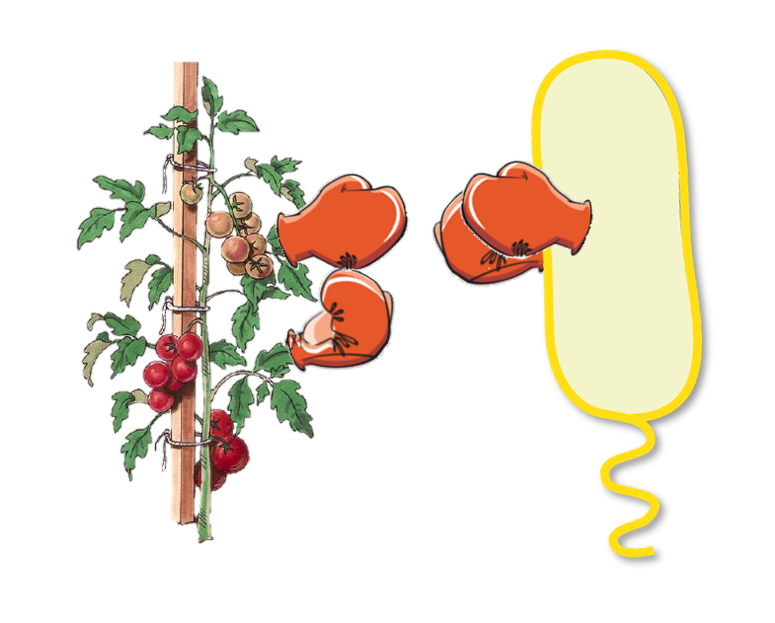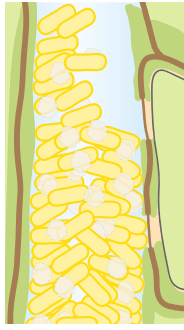 The Lowe-Power lab is a team of plant pathologists and microbiologists driven to uncover the behavioral and fitness adaptations that allow bacteria to colonize plants and cause disease. We use Ralstonia and plant hosts as a model pathosystem to investigate molecular microbial ecology, bacterial behavior and physiology, host specificity, and xylem dysfunction during diease. The questions we address are broadly relevant to vascular and nonvascular plant-colonizing bacteria.
The Lowe-Power lab is a team of plant pathologists and microbiologists driven to uncover the behavioral and fitness adaptations that allow bacteria to colonize plants and cause disease. We use Ralstonia and plant hosts as a model pathosystem to investigate molecular microbial ecology, bacterial behavior and physiology, host specificity, and xylem dysfunction during diease. The questions we address are broadly relevant to vascular and nonvascular plant-colonizing bacteria.
Our latest pre-prints and publications can be found on Google scholar: https://scholar.google.com/citations?hl=en&user=aMxz2moAAAAJ&view_op=list_works&sortby=pubdate
Our research focus is two pronged: we investigate how the host environment shapes bacterial behavior and how xylem pathogens alter the host environment.
Microbial ecology: The Ralstonia life cycle involves chemotaxis to host root exudates, colonization of the rhizosphere, invasion of the root xylem, systemic colonization of the xylem (leading to wilt disease), and return to the soil to persist and find new hosts. At each stage, Ralstonia must resist, evade, and/or suppress external stresses imposed by the abiotic environment, competing microbes, and plant immunity. We use functional genomic and genetic approaches to identify core and clade-specific adaptations to specific stages in the Ralstonia life cycle, with current funding to explore type VI secretion system (T6SS)-mediated warfare and dormancy physiology.
Global biogeography of Ralstonia pathogens: Seeking to unify the extensive literature on Ralstonia populations around the globe, we have an ongoing literature meta-analysis of Ralstonia solanacearum isolations (over 10,000 strains from over 300 papers). We publish updates to the Ralstonia isolation dataset as a “living” BioRxiv pre-print (Lowe-Power et al.).. In collaboration with Dr. Tessa Pierce-Ward, also adapted a web-based, interactive Dashboard that allows users to investigate patterns of Ralstonia biogeography, phylogeny, and host-of-isolation. Dashboard: https://ralstoniadashboard.shinyapps.io/RalstoniaWiltDashboard/
Host specificity: Ralstonia individually have broad host range (over 20 plant families for certain clades) and collectively infect over 250 diverse plant hosts. We are using comparative and functional genomic approaches to identify host specificity factors in several clades that have strains with contrasting host range phenotypes.
Disease physiology: Ralstonia wilt profoundly alters host physiology by disrupting xylem function. Using metabolomics, X-ray microCT, and rheometry, we are studying chemical and biophysical changes to xylem. With these approaches, we are defining the mechanism of xylem dysfunction during Ralstonia wilt and characterizing the chemical and biophysical environment that Ralstonia exploits.
Timelapse of bacterial wilt disease
Video credit: Jonathan Jacobs (OSU). Tomato cv. Bonny Best plant infected with Ralstonia solanacearum (“Rs”-left) next to a healthy control plant (right).
Research interests
Bacteria-plant interactions, Interbacterial competition, Xylem pathogens & mutualists, Host range, genetics, Functional genomics, Metabolism, Microbial ecology, and more
